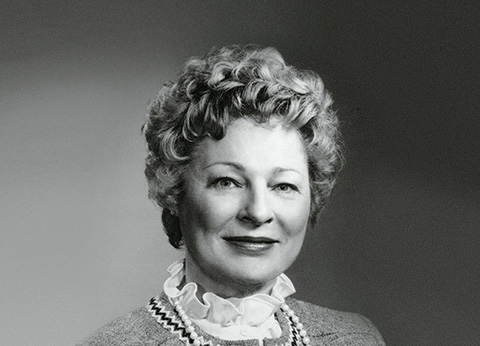Growing up, Phyllis Grosskurth wanted to be a detective; in many ways, that’s exactly what she became. A U of T English professor and critic, Grosskurth was best known as a biographer – one whose eventful life rivalled those of the colourful people whose stories she took fierce delight in discovering.
Grosskurth, who died in August at the age of 91, sustained a riches-to-rags childhood during the Depression. She graduated from U of T’s Trinity College in 1946, and eventually moved to England with her first husband and three children, embarking on doctoral studies in the early 1960s. There, she discovered her first subject: an obscure Victorian poet named John Addington Symonds.
Her dogged research revealed a stash of letters detailing the pain and pleasure of Symonds’ secret gay life, carefully conducted within the repressive atmosphere of the times. Grosskurth’s book on Symonds won a Governor General’s Literary Award in 1964. It was the first of many life stories she would write; like their biographer, all of Grosskurth’s later subjects were iconoclasts. They included Lord Byron, psychoanalyst Melanie Klein and sexologist Havelock Ellis.
In 1965, having returned to Canada, Grosskurth was one of the first female professors hired to teach in the English department at University College. The college had been, in colleague Anne Lancashire’s words, “a bastion of male supremacy since the 1930s,” but new winds were blowing. Lancashire describes Grosskurth as “vivacious, with a very determined personality. . . . and passionate about her research, at a time when it was more difficult than today to get grant money.”
Although Grosskurth taught Victorian literature, she was very much a modern feminist. “I think she had experienced discrimination, and it could make her a little bit prickly to deal with,” says Lancashire. “She was not afraid to speak up on an issue that was important to her.”
This trait was exemplified in 2001, when Grosskurth and three other retired female professors fought the university on the issue of pension equity (the terms of their eventual settlement were confidential).
Grosskurth’s formidable character was tested by many trials, including breast cancer, leukemia and a 2002 stroke that severely limited her mobility. In recent years, she also endured the deaths of son Christopher, a well-known CBC journalist, and third husband Bob McMullan, whom she’d first met many years before as a U of T student.
Despite her problems in old age, Grosskurth continued reading, travelling and living with characteristic grit, right to the end. Eight years ago, she told the Toronto Star that Voltaire’s motto of cultivating your garden was hers as well. With her bold legacy of biography, scholarship and criticism, hers was a well-tended garden indeed.
Recent Posts
U of T’s 197th Birthday Quiz
Test your knowledge of all things U of T in honour of the university’s 197th anniversary on March 15!
Are Cold Plunges Good for You?
Research suggests they are, in three ways
Work Has Changed. So Have the Qualities of Good Leadership
Rapid shifts in everything from technology to employee expectations are pressuring leaders to constantly adapt






